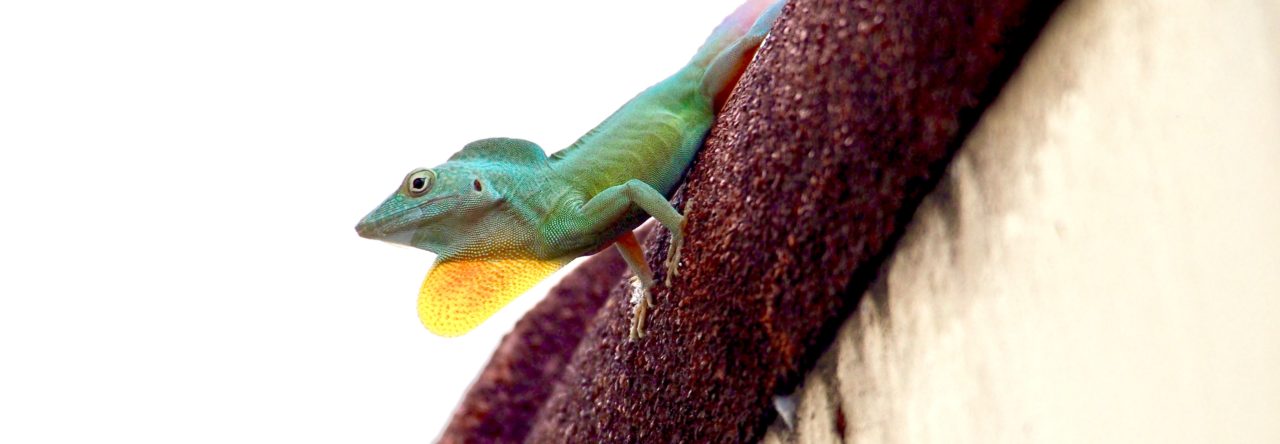
Fairchild Botanical Gardens, site of the 2018 Anolis Symposium
It’s not to late to hop on a plane and get to beautiful Fairchilds Botanical Garden! Abstracts are posted. Here’s the schedule:
9:00 – 9:30 James Stroud Florida International University
Introduction and Welcome
9:30 – 9:45 Michele A. Johnson Trinity University
Physiological mechanisms underlying behavioral convergence in Caribbean anoles
9:45 – 10:00 Tony Gamble Marquette University
Anolis sex chromosomes, past, present, and future
10:00 – 10:15 Rosario Castañeda Universidad Icesi
When did anoles diverge? An analysis of multiple dating strategies
10:15 – 10:30 Colin Donihue Harvard University
Hurricane-induced adaptive shifts in the morphology of an island lizard
10:30 – 10:45 Leo J. Fleishman Union College
Why are there so many yellow dewlaps?
10:45 – 11:30 Coffee Break
11:30 – 11:45 Graham Reynolds University of North Carolina Asheville
Genetic and Morphometric Diversification in the Brown Anole Suggest Early Pathways of Anole Colonization and Evolution in the Caribbean
11:45 – 12:00 Nathalie Feiner Lund University
Transposable elements, Hox gene clusters and genome evolution– How special are Anolis lizards?
12:00 – 12:15 Thomas J. Sanger Loyola University Chicago
The Mechanisms of Thermal Stress Induced Craniofacial Malformation in Lizards Developmental biology
12:15 – 12:30 Sozos N. Michaelides University of Rhode Island
Invasion history of four Anolis lizard species introduced to Bermuda Invasion biology
12:30 – 14:00 Lunch
14:00 – 14:15 Kristin M. Winchell University of Massachusetts Boston
Performance Consequences of Urban Morphological Shifts
14:15 – 14:30 Kenro Kusumi Arizona State University
Comparative Genomics Reveals Accelerated Evolution in Conserved Pathways during Anolis Diversification
14:30 – 14:45 Sean Giery University of Connecticut
Some thoughts on the trophic ecology of Anolis lizards
14:45 – 15:00 D. Luke Mahler University of Toronto
Land use and the restructuring of anole communities across an elevational gradient
15:00 – 15:45 Coffee Break
15:45 – 16:00 Ivan Prates Smithsonian Museum of Natural History
Genomic signatures of adaptation associated with a history of range expansions in South American anoles
16:00 – 16:15 Oriol Lapiedra Harvard University / CREAF
Predator-induced natural selection in behavior Behaviour
16:15 – 16:30 Caitlin C. Mothes University of Miami
Using South Florida’s exotic lizard community to evaluate the use of ecological niche models in predicting biotic invasions
16:30 – 17:00 Neil Losin Day’s Edge Productions
The Lizard’s Tale and Anole Annals v2.0: An enhanced platform for Anolis outreach
17:00
Social & Poster Session
Saturday, 17 March 2018
9:30 – 9:45 Douglas B. Menke University of Georgia
Genome editing methods for the production of genetically modified anoles
9:45 – 10:00 Sarin Tiatragul Auburn University
A shady way to beat the Miami heat
10:00 – 10:15 Joanna O. Palade Arizona State University
Anolis carolinensis satellite cells have expanded musculoskeletal potential
10:15 – 10:30 Gregory C. Mayer University of Wisconsin-
Parkside Using archival DNA to elucidate anole phylogeny Systematics and/or taxonomy
10:30 – 10:45 Liam J. Revell Universidad del Rosario and UMass Boston
Can we detect differences in the rate of discrete character evolution between clades of anoles?
10:45 – 11:30 Coffee Break
11:30 – 11:45 Amber N. Wright University of Hawaii
Predicting the outcome of species interactions in a novel species assemblage: Anolis vs. Phelsuma in Hawaii
11:45 – 12:00 Andrew C. Battles University of Rhode Island
The other Miami Heat: Urban areas alter thermal biology and influence persistence and spread of two invasive Anolis species.
12:00 – 12:15 Nathan W. Turnbough I
Covariation in arthropod community composition and dominant anole identity on dredge spoils islands in Florida
12:15 – 12:30 Cindy Xu Arizona State University
Tail Regeneration in Anole Lizards: Insights from Comparative Genomic Analysis and Reformation of the Peripheral Motor Nervous System
12:30 – 14:00 Lunch
14:00 – 14:15 Michael L. Logan Smithsonian Tropical Research Institute
Using experimental islands to explore evolutionary dynamics under climate change Thermal biology, ecology, or evolution
14:15 – 14:30 Christine Rose-Smyth Verdant Isle Orchids
Role of a sweet-toothed anole in orchid pollination Species interactions
14:30 – 14:45 Christopher J. Thawley University of Rhode Island
Let There Be Light: Widespread Use of Human-Produced Light at Night by Anoles and Its Consequences
14:45 – 15:00 Sean Doody USF St. Petersburg Environmentally Cued Hatching in Anoles Behaviour
15:00 – 15:45 Coffee Break
15:45 – 16:00 Winter A. Beckles University of Miami Signal divergence and habitat partitioning among non-native bark anoles in South Florida
16:00 – 16:15 Stephanie L. Clements University of Miami
Non-native species dominate herpetofaunal community composition in both native and non-native habitat patches in Miami-Dade County
16:15 – 16:30 Zachary A. Chejanovski University of Rhode Island
Predators influence prey body size variation in an urban landscape
16:30 – 16:45 Joshua M. Hall Auburn University
Does season-dependent reproductive value of offspring drive the evolution of life-history traits in Anolis lizards?
16:45 – 17:00 Jonathan Losos Washington University in St. Louis
Concluding Remarks
- Evolution in Real Time on Lizard Island - March 23, 2025
- Spider Snags Adult Anolis osa - March 22, 2025
- An Homage to the Green Anoles of New Orleans - March 21, 2025


David B Wake
What a great program! Congratulations to the anole community on your spirit and accomplishments. I love taxon-based research when it is comprehensive and inclusive.
Liam Revell
I’m about to hop!
Skip Lazell
Gee! Wish I could get there, but it’s too far from Guangdong Province, China….
Skip